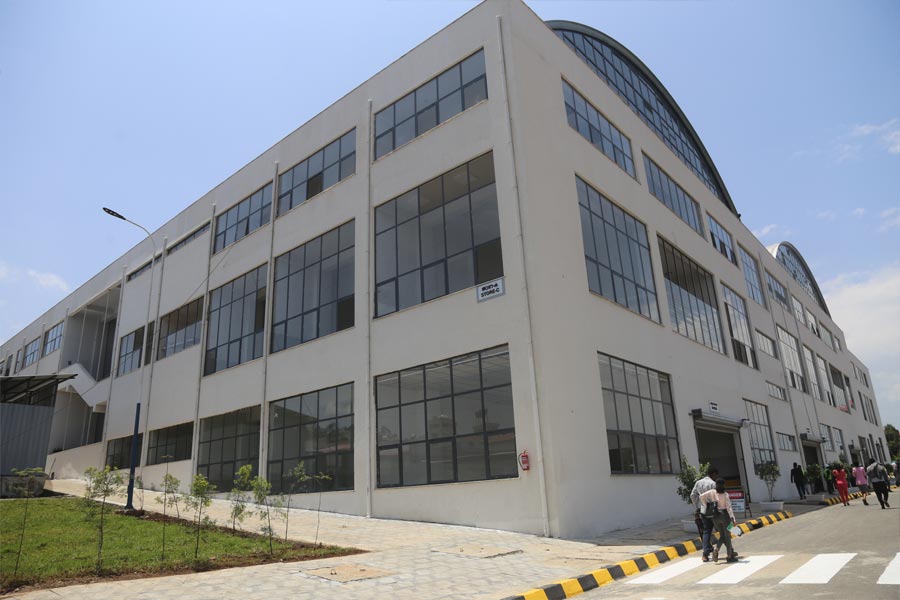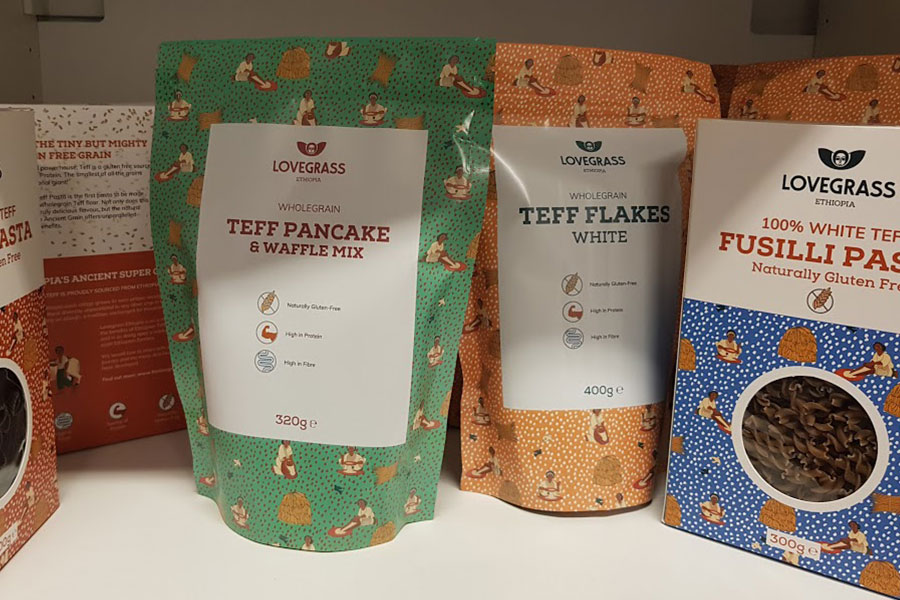
Fortune News | Feb 24,2024
It was a cloudy Sunday two weeks ago, not ideal for outdoor events. The grey sky quickly engrossed Addis Abeba as the rainy days set in. Yet, the dreary weather did little to deter thousands of people from making their way to the government-run Sunday markets spread across the capital.
With close to 30 white tents packed tightly together, the Sunday market around Megenagna was overwrought. Hundreds, if not thousands, of shoppers were in view early in the morning, hoping to take advantage of low prices for consumer goods. After all, these are seasons of runaway inflation eroding household income.
There stood a casually dressed man with a bag over his shoulder. Tadesse Hunegn, 35, was caught in a heated bargain with a trader in one of the tents. The loud words between them attracted the attention of those around - both shoppers and traders. Tadesse had made his way to the market from his home in the Gerji area. He wanted to buy body soap and food items such as pasta. He had hoped these would be available at prices cheaper than what retailers in his neighbourhood would charge. It was what he had heard city officials promised for Sunday markets.
Tadesse's high-pitched steal with the trader resulted from his frustration upon hearing the prices.
“I can't believe this,” Tadesse told Fortune.
The trader offered to sell a pack of pasta for prices barely different from what he would have paid if he had gone shopping nearer his home.
Tadesse's vexation is shared by millions of consumers, who saw their purchasing power steadily eroded by rampant inflation.
The pressure began picking up last August when headline inflation peaked above 30pc. It has not been abated, with each subsequent month registering higher figures. Last month, headline inflation was at 36.6pc, according to the latest report from the Ethiopian Statistics Service. Food inflation stood at 43pc, with cereals such as wheat, teff, and maize showing the highest jumps in their prices.
The prices of cereals are one of the most essential components in the Consumer Price Index (CPI), accounting for 23pc of the basket of goods surveyed.
The unrelenting inflationary pressure has forced consumers like Tadesse to reconsider their budget priorities and tighten their purse strings in a country where food accounts for 54pc of total household consumption expenditure.
The soaring food prices have become a global concern, particularly after Russia invaded Ukraine three months ago. Between them, these countries cover one-fourth of the world's wheat supply. The deep concern has led international policymakers to meet in Berlin, Germany, last week for a global food security summit. Worqneh Gebeyehu (PhD), secretary general of IGAD, told the summit that the number of food insecure people in the Horn of Africa rose by nine million to 49.4 million in just a month since May this year.
The Secretary General attributed 30pc of the price upsurge in the region to conflicts. His country is engrossed by a civil war in the north, a resurgent insurgency in the southwest, and violent conflicts elsewhere. A combination of a pandemic-induced business slowdown, drought and wide budget deficit due to an increase in recurrent budget (mostly defence) put consumers like Tadesse on the receiving end of the economic turmoil.
Tadesse earns a gross salary of 5,300 Br from his job, which he declined to elaborate on. He spends a quarter of his wages to pay for rent for a one-room dwelling he shares with his wife. His hopes that going to Sunday markets once a month would help him cut down on expenses have not panned out for him. His visit to Megenagna on June 19 proved his hope was misplaced.
Standing inside the tent behind a table laden with consumer items, Kefyalew Nigussie had no comforting words for Tadesse.
Kefyalew, sales officer of Edget Be-Hibret Consumer Cooperative, told buyers the prices for a pack of spaghetti 36 Br. It was two Birr lower than what kiosks in Tadesse's neighbourhood ask. A brand of soap was sold for 20 Br a bar, hardly different from what Tadesse would have paid elsewhere.
Consumers continue to flock to the Sunday markets, though the prices of goods on offer are not longer much different to what retailers and kiosks around the capital charge.
“It isn't our fault,” Kefyalew shouted, battling to be heard over the noise in around. “The factories and our suppliers increased their prices recently."
He claimed a shortage of inputs like wheat is to be blamed. However, Kefyalew saw consumers buy large quantities of food items and agricultural commodities, although demand for industrial products at the Sunday market was falling. Of the 10qtl of onion he had brought with him to market that day, only two remained by lunchtime.
Kefyalew's trade is a small part of a larger ambition by Mayor Adanech Abiebie and her team at the Addis Abeba City Administration to tame inflationary pressure in the market. In the absence of viable policy responses to fight back the vagaries of the market at the federal level, city officials resorted to shifting the blame on businesspeople for alleged hoarding and intermediaries for speculation. They were determined to weed out the intermediaries.
In October last year, they introduced a Sunday Market platform, hoping direct transactions between producers and consumers narrow the margins benefiting the latter.
Organised by the Addis Abeba Trade Bureau, in partnership with the city's Cooperative Agency, Sunday markets are dominated by the 148 consumer cooperative unions operating in the capital. They have received half a billion Birr this year from the city administration in a revolving fund to promote these markets.
The initiative had initially shown promise, providing a semblance of respite for the residents of a city where living costs have become unruly. Sellers had been offering consumer items at much lower prices. In its early days, a kilo of macaroni was cheaper by 10 Br than retail outlets offer at 65 Br. Municipal authorities' claimed Sunday markets helped reduce food prices by 30pc, on average. The low prices attracted large numbers of shoppers, forcing retailers elsewhere in the city to lower their prices.
The success was fleeting.
Recently, consumers such as Tadesse see commodity prices at the weekly markets are soaring.
However, for Mesfin Asefa, deputy head of the Addis Abeba Trade Bureau, the Sunday markets have successfully stabilised the prices of food items.
“This is why we decided to expand the initiative,” he said.
The Sunday Markets initiative is an extension of a scheme introduced to the capital more than a decade ago. Since 2010, the government has been providing subsidised food items such as wheat to low-income households, channelling the produce through cooperative outlets. The markets were launched at five locations in Addis Abeba at the beginning but ballooned to 96 in less than a year. Agricultural produce and industrial commodities valued at over 136 billion Br have been supplied through the weekly markets, according to information obtained from the Cooperative Agency.
However, the Sunday Markets benefit a particular stratum of the urban population. Those with higher incomes frequent the markets, while the poor are left out in the cold as even the slightly lower prices are simply beyond reach. Over the past decade, Ethiopia‘s economy has expanded rapidly, double-digit growth. Yet, the high food prices threaten to undo the benefits of economic gain, pushing more families deeper into the poverty trap.
Experts observed that a larger segment of the population is likely falling into the poverty trap due to inflationary shocks. Low-income and vulnerable households across the country are most prone to suffering from rising food prices, according to Atlaw Alemu (PhD), an economist.
The galloping inflation makes life hard, particularly for the urban destitute, that constitute part of the 30pc of the population living under the poverty line.
Almaz Mekuria, a resident of Addis Abeba, could be one of these. In her 60s, she lives with her two grandsons and a daughter who was recently deported from Saudi Arabia, empty-handed. Almaz's family lives in a one-bedroom house around Kotebe in Yeka District, for a subsistence living.
Last week, she was seeding flowers behind Kotebe Metropolitan University along with four women. It pays her 120 Br a day, a five-day work a week offered by a development initiative to do waste management and urban beautification.
“It hasn't been enough to feed my grandsons once a day,” she told Fortune.
Almaz is one of the 800,000 beneficiaries of the safety-net programme in her wereda, a part of an initiative started in 2017 with 550 million dollars in funding. More than half of the fund paid by the World Bank, the first phase had supported a little more than half a million poor in 11 cities, including Addis Abeba. Residents designated by local administrators as "the poorest of the poor" receive 2,400 Br a month for work done to keep their neighbourhood clean and net.
“The amount of money disbursed to direct and indirect beneficiaries has been growing based on the cost of living,” said Abraham Petros, director of urban food self-sufficiency and safety-net.
Payments to beneficiaries like Almaz rose from 90 Br a day last year. Nonetheless, the programme covers less than a fifth of the beneficiaries officials hope to reach.
City officials tried other initiatives targeting inflationary pressure. A school feeding programme under the City Administration provides two meals a day to primary school children in 290 public schools.
Almaz says she would have been unable to feed her grandsons if it were not for this programme.
Despite these initiatives, the rising cost of living gives no break to consumers. Ahmed Shide, minister of Finance, admitted to Parliament that the economy was grappling with multiple challenges and shocks, both internal and external. He is among the officialdom associating inflation mostly with disruptions in the global economy, often to agricultural supply shortages, and illicit trade practices.
However, experts and officials are not on the same page on what causes such dramatic price rises. Experts urge are other factors are at play here.
Inflation is deeply rooted in the government’s financing of its budget deficit, according to Atnafu Gebremeskel (PhD), assistant professor of economics at Addis Abeba University. An executive member of the Ethiopian Economics Association, Atnafu published a study two years ago examining the inflationary dynamics in the macroeconomic stability. He looked into the prices of 280 commodities over 23 years.
His findings were conclusive. Monetary growth accounts for 80pc of inflation, suggesting that the money supply is a significant factor driving prices upward. It is a troublesome phenomenon where the central bank prints more money than the economy absorbs to lend to the government to pay for its budget deficit.
Officials' claim that they are determined to avoid direct borrowing from the central bank has been a promise unfulfilled. Last year, borrowing from the central bank grew by 52 billion Br, topping 113 billion Br in the first quarter of this year. The 786.6 billion Br budget bill for the coming fiscal year tabled to Parliament three weeks ago also comes with a huge appetite for deficit financing. It is projected at 308 billion Br, reaching nearly four percent of the GDP.
Federal officials plan to pay for 86pc of the deficit through borrowing from domestic sources, mainly from the central bank's treasury bill (T-bill) auctions. This is, however, a daunting task considering declining tax revenues, which are expected to fall by a quarter this year.
Semeneh Bessie (PhD) is an associate professor of economics and director of partnership and communications at the Ethiopian Economics Association. He sees the global food crisis brought on by the pandemic and Russia's war in Ukraine have not had as strong an impact on domestic food prices as supply shortages locally.
“External shocks coupled with supply shortages have been the major factors,” said Semeneh.
Nonetheless, Russia's war has wreaked havoc on supply in the crucial Black Sea breadbasket region, upending global trade flows and fueling panic about shortages of staples such as wheat and cooking oil. The war sends shockwaves to Ethiopia, a country importing 30pc of its crude and refined cooking oils (mainly from Malaysia), and wheat from Russia and Ukraine.
A few weeks after the war erupted in Ukraine, the price of a five-litre bottle of sunflower oil skyrocketed, reaching 1,000 Br. Ukraine is the world's foremost producer of sunflower oil.
Although Semeneh disagreed with Atlaw's views on the significant factors fueling inflation, he does not entirely disregard the money supply growth as a factor.
“It isn't the growth of money injected into the economy that is a factor,” he said. “Rather, how it is injected matters the most."
The federal government has been spending hundreds of billions of Birr in public infrastructure to induce the demand side of the equation. The supply side has not been given as much attention, not helping the increase in productivity.
The federal government appropriates close to 10pc of its annual budget to the agricultural sector, employing nearly 80pc of the population. However, productivity has not been improved significantly. Massive imports meant to stabilise prices are taken as options. Starved of foreign exchange, federal officials allowed, in April last year, a Franco-valuta scheme to ease the escalating food prices. They issue special permits to importers who bring in food products such as wheat, sugar, cooking oils, and rice, using foreign currencies from overseas.
In Franco-valuta, goods are imported without the need for importers to open letters of credit (LC) or enter cash against documents (CAD) agreements at commercial banks, hence not demanding forex commitment from the country where the goods are exported to. Annually, commodities valued at 14 billion Br are imported through Franco Valuta.
The scheme is compelling; the government extended the period last year to include essential items, says Meskerem Motti, director of commodity price research at the Ministry of Trade & Regional Integration (MoTRI).
In the past three months, 45 companies imported more than 50 million litres of cooking oil, while another 145 companies imported 2.5 million quintals of sugar through Franco Valuta.
Atlaw observed that the import volumes are insignificant compared to the demand and argued that the scheme is a breeding ground for illicit activities in the parallel market.
“The black market has been the major source of foreign currency for importers," he said.
Despite the various measures officials take from Sunday Markets to Franco-valuta and lifting excise taxes and duties on imported food items, pulling the inflation rate into the fabled single-digit zone remains a daunting task for the administration of Prime Minister Abiy Ahmed (PhD).
Experts caution addressing the weak links should instead be the focus of policymakers when they provide resource support to actors in the economy. But the government is going in the other direction.
Last week, regulators at the central bank decided to lower the reserve requirement for commercial banks by half, injecting close to 80 billion Br into the banking system and stoking fears of aggravating inflationary pressure. The progressive lifting off of fuel subsidies slated to begin in a couple of weeks is likely to worsen matters.
Higher prices for groceries put pressure on the incomes of many residents like Tadesse, who went to his home last Sunday empty-handed. They are bound to shift their budgets to cover the most essential necessities, cutting down on all other expenses. It is even grimmer for the needy like Almaz, who does odd jobs like washing clothes to make ends meet. The earnings she makes may not be enough to pay to feed her grandsons once a day.
PUBLISHED ON
Jun 25,2022 [ VOL
23 , NO
1156]

Fortune News | Feb 24,2024

Fortune News | Apr 13,2024

Featured | Jan 05,2019

Fortune News | Aug 12,2023

Agenda |

Commentaries | Apr 30,2021

Viewpoints | Jul 30,2022

Fortune News | Feb 06,2021

Sunday with Eden | Jun 10,2023

My Opinion | Jul 09,2022

Dec 22 , 2024 . By TIZITA SHEWAFERAW
Charged with transforming colossal state-owned enterprises into modern and competitiv...

Aug 18 , 2024 . By AKSAH ITALO
Although predictable Yonas Zerihun's job in the ride-hailing service is not immune to...

Jul 28 , 2024 . By TIZITA SHEWAFERAW
Unhabitual, perhaps too many, Samuel Gebreyohannes, 38, used to occasionally enjoy a couple of beers at breakfast. However, he recently swit...

Jul 13 , 2024 . By AKSAH ITALO
Investors who rely on tractors, trucks, and field vehicles for commuting, transporting commodities, and f...

Jul 12 , 2025
Political leaders and their policy advisors often promise great leaps forward, yet th...

Jul 5 , 2025
Six years ago, Ethiopia was the darling of international liberal commentators. A year...

Jun 28 , 2025
Meseret Damtie, the assertive auditor general, has never been shy about naming names...

Jun 21 , 2025
A well-worn adage says, “Budget is not destiny, but it is direction.” Examining t...